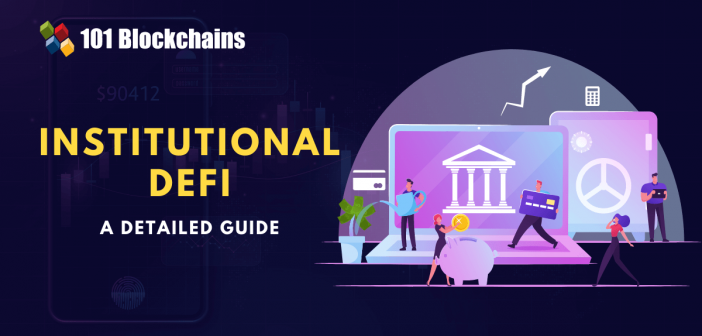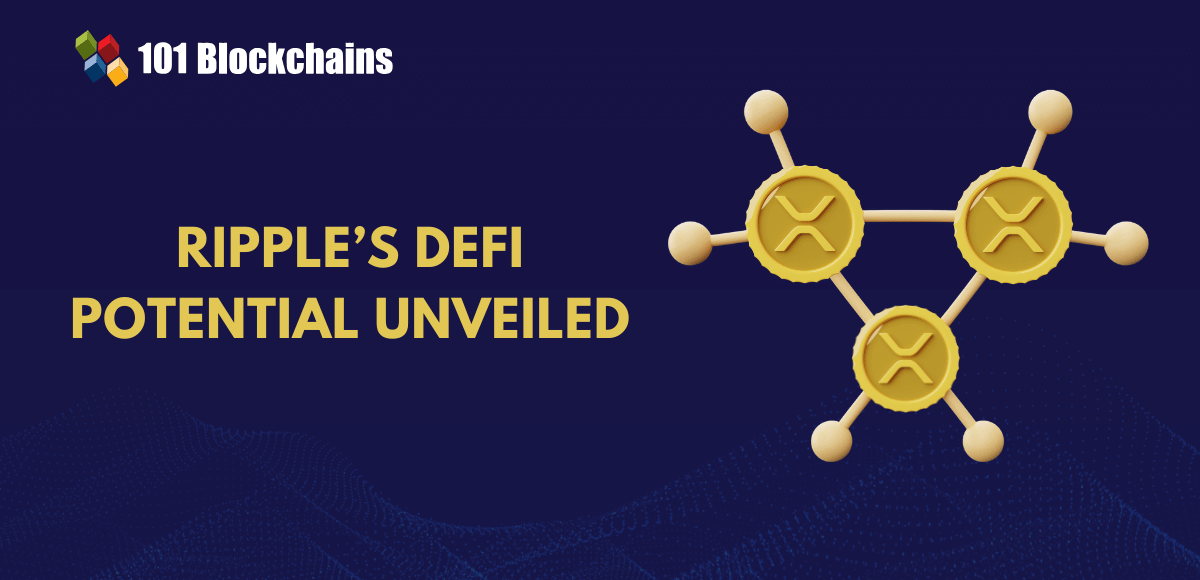Learn how blockchain truly works, master key definitions, and uncover what makes smart contracts so "smart." Dive into the fundamentals, gain valuable insights, and start your blockchain journey today!

- Decentralized Finance
Gwyneth Iredale
- on October 14, 2021
A Comprehensive Guide on Institutional DeFi
New to the term Institutional DeFi? Here we bring the definitive guide on institutional DeFi for you to understand its know-how.
Decentralized finance (DeFi) has been evolving as a prolific concept to describe the transition to peer-to-peer finance from conventional, centralized financial systems. The past year witnessed profound growth in the popularity of decentralized lending and borrowing platforms, payments products, prediction markets, insurance, margin trading, and many other DeFi solutions. In addition, completely new forms of investment such as yield farming and staking have also evolved in recent times.
Most important of all, the existing DeFi ecosystem offers representation for an extended network of integrated protocols and financial instruments. With a value of over $60 billion, institutional DeFi finds an easy opening as many of the world’s leading financial institutions turn towards DeFi. The following discussion offers you an overview of DeFi in case of institutions and the factors which have led to its popularity.
Want to know what is the scope and purpose of DeFi? Enroll Now: Introduction to DeFi – Decentralized Finance Course
Is DeFi Reliable?
In order to understand the meaning of DeFi for institutions, it is important to understand DeFi clearly. DeFi (Decentralized Finance) basically refers to a group of automated, smart-contract-based solutions running on blockchain networks. The objective of DeFi solutions focuses on ensuring better transparency, openness, and interoperability with existing models of financial services.
DeFi offers a non-custodial, peer-to-peer environment focused on leveraging the benefits of faster transaction settlement and transparency. Within a limited timeframe, the DeFi space has been able to accumulate profoundly massive potential investment returns. As of September 2021, the total value of assets leveraging DeFi protocols amounted to somewhere between $160 billion and $190 billion. Therefore, it is highly unlikely for the institutional players to ignore the prospects associated with DeFi.
Learn the fundamentals of Decentralized Finance (DeFi) with DeFi Flashcards
What is Institutional DeFi?
The first thing you need to understand DeFi for institutional players is the answer to ‘what is institutional DeFi?’ and its differences with conventional finance. Institutional DeFi basically points to the ecosystem of blockchain-based financial solutions created according to institutional requirements with stringent compliance requirements. Institutions can find shocking differences between DeFi and traditional finance without the involvement of any centralized party in asset settlement.
The returns in conventional financial systems emerge from lending for capital which you must use with objectives of expected returns. DeFi takes this idea further and enables any individual to obtain returns from offering their assets into a market. How? They can pool the assets which could be implemented in work within a few days. As a result, DeFi could easily address the limitations of conventional collateral-based lending with better efficiency.
Want to explore in-depth about DeFi protocol and its use cases? Enroll in Decentralized Finance (Defi) Course- Intermediate Level Now!
Differences from Conventional Finance
The effectively growing institutional interest in DeFi relies largely on the identification of the differences between DeFi and traditional finance. As a matter of fact, the differences introduced by DeFi could be challenging today, albeit with better prospects for introducing fundamental changes in business operations in the future. Here are some of the notable differences DeFi has with conventional finance.
- DeFi enables automatic pooling of investor assets, thereby resulting in a mix of assets. With the help of automated smart contracts, DeFi can offer liquidity for the assets. However, the lack of advanced accounting software and on-chain analytics could lead to setbacks in record tracking and reconciliation.
- Management of assets by smart contracts also creates questions regarding liability for loss of funds. Individual users cannot experience any issues with such an approach for asset management. However, regulated entities would experience profound issues.
- Users interact with blockchain addresses for using DeFi. As of now, you couldn’t find a reputation system for rating the creditworthiness or risk of a lender. In addition, there is no existing default process for KYC or AML in DeFi solutions. As a result, institutions could land up with considerable compliance issues.
So, institutional DeFi is definitely difficult with the issues of mixing assets, money laundering, or hacking of assets. Furthermore, the lack of clarity regarding the regulation of DeFi and tax implications lead to profound issues. How can DeFi for institutional players address these issues to move forward? DeFi solutions for institutions should address the compliance requirements effectively. Here are some of the notable ways in which DeFi addresses compliance needs.
- Ensuring transactions only with the known counterparties which have already completed the KYC and whitelisting process.
- Offering additional connectivity options for other solutions alongside better integration with custody providers as well as other tools.
- Offering compliance tools for identification of counterparties.
So, what is encouraging the development of such DeFi products for institutions? Here are the two important reasons which you can think of while learning about DeFi for institutions.
- Institutional demand for ‘higher than average’ interest-centric returns in comparison to conventional financial products as a measure for diversification.
- Cost reduction in offering financial services with DeFi-based solutions opens new possibilities for ‘banking the unbanked.’
Want to explore an in-depth understanding of security threats in DeFi projects? Enroll in DeFi Security Fundamentals Course Now!
Why is DeFi So Attractive to Institutions?
The recent developments in the domain of DeFi showcase a revolutionary transformation in the whole financial system. Most important of all, the whole financial system is going through an overhaul with improved transparency, composability, and security throughout protocols. The interest in institutional DeFi is growing due to the substantially radical financial innovation, which leads to radical investment returns and opportunities. As a result, more and more institutions are showing their interest in DeFi. Here are some of the notable highlights which showcase the validity of growing institutional investments in DeFi.
-
Digital Asset Trading
Digital decentralized exchanges or DEXs and automated market makers along with token swapping aggregators serve as cryptocurrency exchanges. They can enable peer-to-peer transactions while also putting users in control of their funds. Decentralized exchanges such as Uniswap also resolve the issues in the accessibility of crypto assets. Most important of all, DEXs are offering strong competition to centralized exchanges.
-
Yield Farming
The increasing institutional interest in DeFi also relies largely on yield farming opportunities. Yield farming offers the flexibility for staking crypto assets in different non-custodial DeFi protocols for earning better interest rates. Some of the notable yield farming protocols such as Enzyme, Vesper, and Yearn have been encouraging the adoption of DeFi for institutions. Without yield farming platforms, users would have to look for protocols offering the best returns.
-
Lending Protocols
Another potential answer to ‘Why is DeFi so attractive to institutions?’ refers to the continuously increasing popularity of lending protocols. The two most popular non-custodial and decentralized peer-to-peer lending platforms include Compound and Aave. These platforms enable users to borrow funds without setting crypto assets as collateral. In addition, they also help users in lending cryptocurrency at higher interest rates in comparison to traditional finance.
Want to understand the best ways to use DeFi development tools like Solidity, React, and Hardhat? Enroll now in DeFi Development Course!
Possibilities for Institutional DeFi
With so many opportunities in DeFi, it is inevitable for institutions to consider DeFi adoption for elevating their competitive advantage. However, it is also important to look at the possibilities of the adoption of DeFi by financial institutions. As of now, the DeFi ecosystem could offer three distinct options for encouraging institutions to adopt the new paradigm. Most important of all, the selected route for institutional DeFi would depend considerably on evolution in the regulation, adoption, and maturity of the solutions. Here are some of the ways in which you can see organizations adopting DeFi in the future.
-
Permissionless DeFi
The DeFi system has evolved profoundly in recent times. Now, it is at a stage where any individual with a crypto wallet could showcase the ability to engage and participate in any public DeFi solution.
-
Permissioned DeFi
Another potential method to adopt DeFi for institutions would point towards permissioned DeFi. The approach focuses on introducing an identification layer for the network or product. Permissioned DeFi involves encapsulation of a DeFi product operating on a permissionless network with an additional verification layer with additional software.
Therefore, you can have an ‘indexer’ for all the identities of all parties which are involved in a transaction and have submitted the necessary relevant information. Even if the majority of permissioned DeFi providers are centralized, many other companies are seeking opportunities to provide decentralized identifiers or DIDs.
-
Centralized DeFi
The institutional interest in DeFi has also birthed the possibilities for private DeFi. It involves the use of smart contracts for managing and settlement of transactions, albeit on a private blockchain. Many infrastructure giants such as Quorum and Corda are opting for centralized DeFi.
It could help groups of companies for running independently from public chains over their own blockchain networks. As a result, it can offer better prospects for ensuring compliance. However, you have to encounter the trade-off in compromising the distributed nature of the solutions.
Build your identity as a certified blockchain expert with 101 Blockchains’ Blockchain Certifications designed to provide enhanced career prospects.
Bottom Line
Traditional safe asset yields are at all-time lows, with returns throughout financial markets being restricted to bare minimums. Therefore, institutions with money at their disposal want to know ‘what is institutional DeFi?’ for finding new places for investing their capital. DeFi has offered a promising alternative to traditional finance with advantages of security and transparency.
Furthermore, DeFi solutions such as decentralized exchanges have shown promising potential during market downturns in comparison to conventional centralized exchanges as DeFi providers look forward to addressing the concerns of institutional interest. The DeFi revolution among institutions could present a new offering for entities eager to deploy capital in products with better security and trust. Find more about the prospects in DeFi for institutional players and leverage its true potential now.
*Disclaimer: The article should not be taken as, and is not intended to provide any investment advice. Claims made in this article do not constitute investment advice and should not be taken as such. 101 Blockchains shall not be responsible for any loss sustained by any person who relies on this article. Do your own research!



![30+ Best Decentralized Finance Applications [Updated] best decentralized finance (DeFi) applications](https://101blockchains.com/wp-content/uploads/2020/10/decentralized-finance-applications.png)

